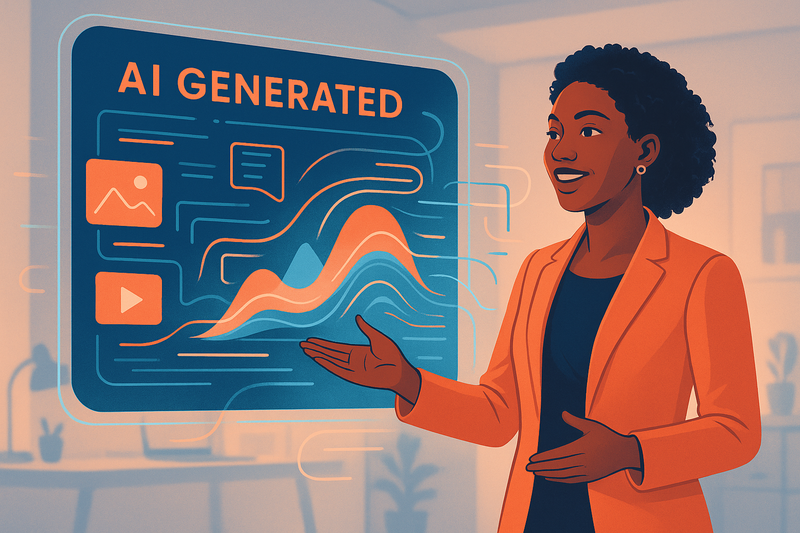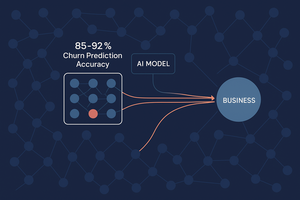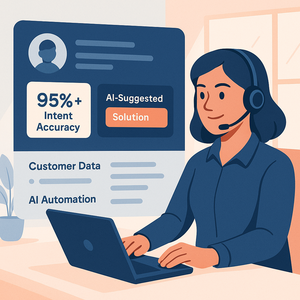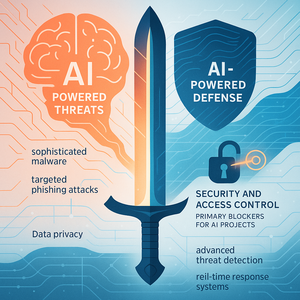Navigating the AI Transformation Tightrope: Balancing Innovation, Regulation, and Human Capital
The artificial intelligence landscape in late 2025 presents a complex picture of immense opportunity tempered by significant operational challenges....
4 min read
 Peter Vogel
:
July 21, 2025
Peter Vogel
:
July 21, 2025

The AI landscape continues its relentless evolution, pushing beyond incremental updates to deliver tangible shifts in business strategy, operational efficiency, and even our understanding of intelligence itself. This week is no exception, with significant developments impacting everything from advanced research and enterprise integration to how organisations evaluate AI's true potential. For Operations/Technology Executives, Marketing Leaders, Growth-Focused CEOs, Sales Directors, and Customer Service Leaders, understanding these shifts is paramount to maintaining a competitive edge and driving sustainable growth.
This article distils the week’s key AI developments, providing actionable insights specifically tailored to help C-suite and departmental leaders navigate this complex transformation. We cut through the hype to deliver precise, practical implications, underscoring how strategic AI adoption can address critical business challenges and unlock new opportunities. Helium42 stands ready to guide organisations through these pivotal moments, ensuring responsible and impactful AI implementation.

AI is rapidly transitioning from a mere tool to a genuine collaborator, particularly in the realm of scientific research and development. This shift has the potential to drastically alter R&D timelines and costs across various industries. DeepMind's Alpha Evolve embodies this evolution, showcasing how Large Language Models (LLMs) can drive algorithmic innovation and mathematical discoveries (Nature Journal, 2025).
This system combines LLMs with evaluators, creating a ""harness"" that allows AI to test hypotheses and refine its outputs iteratively, an approach mirroring the scientific method (Nature Journal, 2025). This approach demonstrates AI’s potential to accelerate research and development (R&D) across various scientific domains (Nature Journal, 2025). This heralds a future where AI contributes not just to existing knowledge but leads the way in new discoveries. However, this also presents implementation challenges. Organisations must develop strategies for understanding and trusting AI-generated results, especially in critical applications, and address the need for interpretability of generated code.

New AI models, such as Grok 4 and Grok 4 Heavy from xAI, are rapidly advancing in reasoning and problem-solving, potentially transforming various industries. Grok 4 Heavy’s use of tools during reasoning sets it apart. Models like Grok 4 Heavy utilise external tools for real-time data validation, which can significantly reduce hallucinations in enterprise settings (Stanford HAI, 2025; xAI Blog, 2025). As AI capabilities advance, the ultimate test for models like Grok 4 will increasingly shift from academic benchmarks to real-world applications, demanding practical, verifiable outcomes.

Economic shocks, whether driven by trade policies or technological advancements like AI, can have profound and disruptive effects on industries and communities. By understanding the parallels between these events, organisations can better prepare for the challenges and opportunities that lie ahead. The ""China Shock"" saw import competition lead to the decline of U.S. manufacturing regions over several decades. This highlights how sudden policy shifts can create chaos, not order. The intricate nature of global supply chains means that economic policies can have complex and sometimes unintended consequences on manufacturing and trade dynamics.
Now, AI could trigger a similar shock. As AI-driven automation continues to advance, particularly in tasks traditionally performed by humans, industries may experience rapid and regionally concentrated shifts in employment and operational models (McKinsey, 2025; World Economic Forum, 2025). It is important for governments to provide multi-year clarity if they want companies to adapt and invest wisely.

Multimodal AI tools are maturing rapidly, empowering creators and developers to build sophisticated outputs. This shift is driven by advancements from Google DeepMind, such as Veo 2.0 and Project Astra, which integrate text, image, and video to create dynamic media experiences (DeepMind Announcement, 2025; Google DeepMind, 2025).
Google DeepMind's Veo 2.0 offers advanced video generation with enhanced temporal understanding, while Project Astra pushes the boundaries of multimodal interaction through context-aware AI agents and intuitive interfaces (DeepMind Announcement, 2025; Google DeepMind, 2025). These advancements offer increased creative control for content creators and artists, but also present potential implementation challenges, such as balancing creative control with AI generation.

As AI-driven efficiency becomes more prevalent, a critical question emerges regarding the reinvestment of these gains into improving worker conditions. Data suggests that while AI adoption boosted productivity by 34% on average, only 18% of savings were reinvested in employee development (World Economic Forum, 2025). This trend raises significant ethical considerations about the impact of AI implementation on workforce morale.
Helium42's view is that opportunities exist for businesses, particularly agile, growth-focused organisations, to leverage AI to enhance employee well-being and productivity, rather than solely focusing on cost reduction. A re-evaluation of company values is needed to prioritise worker well-being alongside business growth. This shift also highlights the importance of human-centred design for AI implementations, ensuring that technology enhances rather than replaces human capabilities.

The artificial intelligence landscape in late 2025 presents a complex picture of immense opportunity tempered by significant operational challenges....

The discourse surrounding artificial intelligence is maturing. Across boardrooms and operational teams, the conversation has decisively shifted from...

The artificial intelligence landscape is no longer a distant frontier; it's rapidly reshaping the present, demanding a strategic response from...